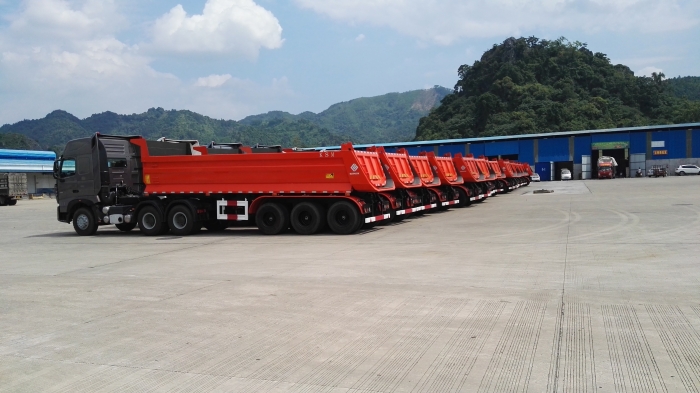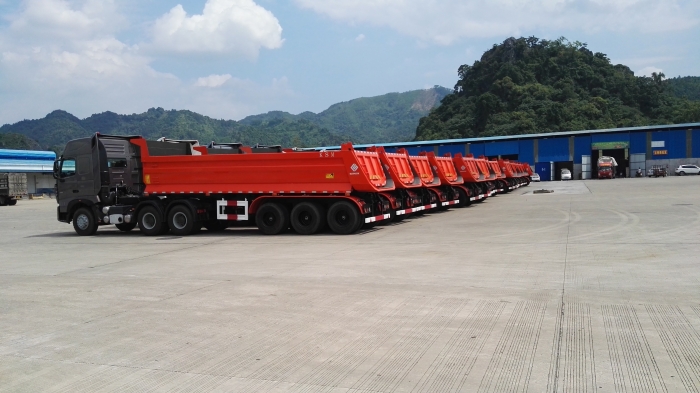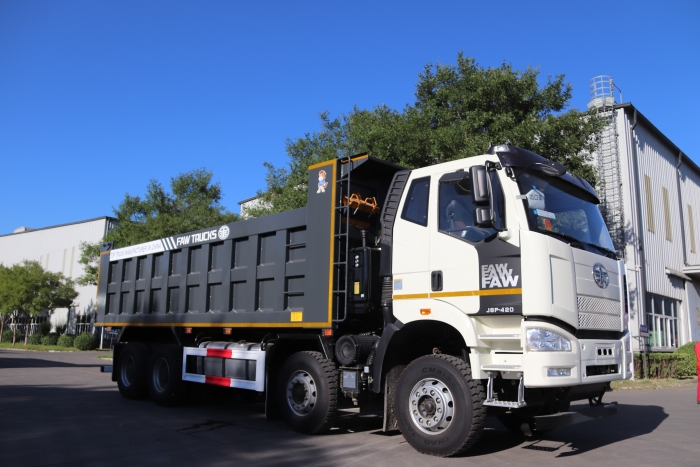- PRODUCTS
- SOLUTION
- SERVICE
- NEWS
- ABOUT US
The primary purposes of a 60-foot semi trailer encompass a wide range of functionalities critical to the backbone of modern logistics and freight transportation. These trailers play an essential role in transporting general cargo, bulk goods, specialized items, and performing in unique logistics operations with efficiency, safety, and sustainability at the forefront.
A 60-foot semi trailer stands as a pivotal component in the transportation and logistics industry, embodying a specialized type of large vehicle designed to transport a wide array of goods across vast distances. Typically measuring 60 feet in length, these trailers offer significant cargo space, making them an ideal choice for hauling large quantities of goods. Their construction includes a robust frame, a flat or specialized loading area, and wheels situated at the rear, with the front part supported by the tractor unit. This design allows for efficient load distribution and stability during transit.
Semi trailers come in various types and configurations, each tailored to meet specific transportation needs. The primary categories include:
· Flatbed trailers: Ideal for oversized loads or machinery that does not require enclosure. Their open design facilitates easy loading and unloading from any side.
· Dry vans: The most common type, used for transporting boxed or palletized goods. They provide protection from the elements and security for the cargo.
· Refrigerated ("reefer") trailers: Essential for perishable goods that need temperature control during transit. These trailers have built-in cooling systems to maintain specific temperatures.
· Tankers: Designed for liquid or gas transport, ranging from water and fuel to chemical substances. Their construction varies depending on the cargo's nature, ensuring safety and compliance with regulations.
Each type of semi trailer supports a range of load capacities, from 42,000 to 45,000 pounds on average, depending on the trailer's construction and the regulations governing road transport. Innovations in materials and design, such as aluminum and composite materials, have allowed for lighter trailers that can carry heavier loads, enhancing fuel efficiency and reducing operational costs.

The versatility of 60-foot semi trailers lies in their adaptability to different transportation requirements. For instance, flatbed trailers are indispensable in the construction industry for moving heavy machinery, while refrigerated trailers play a crucial role in the food and pharmaceutical sectors by ensuring products remain at optimal temperatures throughout their journey.
Moreover, advancements in trailer technology, such as aerodynamic enhancements and smart systems for tracking and load management, have significantly improved the efficiency and safety of transporting goods. These features not only reduce fuel consumption and emissions but also ensure the integrity of the cargo, thereby minimizing losses and maximizing profitability.
In summary, the 60-foot semi trailer represents a cornerstone of modern freight transport, offering flexibility, efficiency, and reliability for shipping a diverse range of goods. Its evolution continues to impact the logistics industry positively, driven by ongoing technological improvements and the ever-growing demands of global trade.
60-foot semi trailers play a pivotal role in the transportation of goods, serving a broad spectrum of industries by facilitating the movement of general cargo, bulk goods, and specialized items. The versatility of these trailers allows for the efficient transportation of everything from consumer goods packed in boxes to large, bulky construction materials.
· General Cargo: For the transportation of non-perishable goods such as furniture, electronics, and boxed items, dry vans are the go-to configuration. These trailers protect goods from weather elements and provide secure transport.
· Bulk Goods: Commodities like agricultural products, construction materials, and other bulk items often require flatbed trailers or open-top trailers for easy loading and unloading with cranes or other machinery.
· Specialized Cargo: High-value or delicate items, including electronics and medical equipment, might need trailers with climate control or enhanced security features.
Selecting the right semi trailer configuration is crucial and depends on the cargo's specific requirements, such as weight, size, and sensitivity to temperature or movement. For instance, refrigerated trailers are essential for perishable goods to maintain freshness over long distances, while tankers are designed for liquid or gas transport, requiring special materials and construction to prevent leaks and ensure safety.
Specialized semi trailers meet the unique demands of cold chain transport, hazardous materials, and heavy equipment.
· Cold Chain Transport: Refrigerated (reefer) trailers provide controlled temperatures, crucial for food, pharmaceuticals, and other perishables. These trailers maintain specific climate conditions to ensure product integrity upon delivery.
· Hazardous Materials: Transporting hazardous materials requires tankers or trailers with specialized linings and safety features to mitigate risks associated with spills, explosions, or contamination.
· Heavy Equipment Transport: Lowboy trailers, distinguished by their low ground clearance, are ideal for hauling heavy machinery such as construction equipment, facilitating easy loading and reducing the risk of tipping during transport.
These specialized transports impose stringent requirements on trailer design, including materials resistant to corrosion or chemical reaction, advanced locking mechanisms for safety, and systems for temperature or atmosphere control.

In logistics and distribution systems, 60-foot semi trailers are instrumental in enhancing transportation efficiency and reducing costs. Their capacity to carry large volumes of goods in a single trip contributes significantly to optimizing supply chain operations.
· Efficiency and Cost Reduction: The large cargo space reduces the need for multiple trips, saving on fuel and labor costs. Advanced tracking and load optimization technologies further streamline operations, allowing for real-time monitoring and better planning.
· Supply Chain Optimization: Integration of smart technologies in semi trailers, such as GPS tracking and temperature monitoring, improves the reliability of delivery schedules and the quality of goods upon arrival. These technologies enable logistics companies to respond swiftly to changes in demand or route disruptions, ensuring that goods reach their destinations in a timely and cost-effective manner.
Through careful selection of trailer types and the incorporation of technological advancements, the use of 60-foot semi trailers in cargo transportation, specialized transport, and logistics and distribution systems represents a critical component of modern supply chain management, driving efficiency, and sustainability in the transportation sector.
Recent years have witnessed significant advancements in semi trailer design and manufacturing, introducing new technologies aimed at enhancing transportation efficiency, safety, and environmental sustainability. These innovations include the use of lightweight materials, aerodynamic optimizations, and smart systems that collectively transform how goods are transported across distances.
The shift towards lightweight materials such as aluminum and composite materials marks a pivotal change in semi trailer construction. These materials not only reduce the overall weight of the trailer, allowing for the transport of heavier loads within legal limits, but also significantly improve fuel efficiency. For example, using aluminum can decrease a trailer's weight by up to 30%, translating into substantial fuel savings and reduced greenhouse gas emissions over the trailer's lifecycle.
Aerodynamic enhancements have been another focus area, with designs that minimize air resistance and improve fuel economy. Features like side skirts, rear tail fairings, and streamlined shapes can reduce drag by up to 10%, leading to an average fuel saving of 5%. Such optimizations are crucial in long-haul transportation, where even minor improvements in fuel efficiency can result in significant cost reductions and lower environmental impact.
The integration of smart systems into semi trailers represents a leap forward in transportation technology. GPS tracking, temperature monitoring, and advanced telematics systems offer real-time data on vehicle location, cargo condition, and route efficiency. These systems enhance the safety and reliability of cargo transportation by enabling proactive responses to potential issues and optimizing routes to avoid delays. Furthermore, smart technologies facilitate better load management, ensuring that trailers are fully utilized, which maximizes efficiency and reduces the number of trips needed.

These technological innovations collectively elevate the transportation sector by:
· Improving Efficiency: Lighter trailers and aerodynamic designs contribute to lower fuel consumption, allowing more goods to be transported with less energy. Smart systems optimize routing and load management, further enhancing efficiency.
· Enhancing Safety: Smart systems provide critical information on vehicle health and cargo status, allowing for timely maintenance and preventing accidents caused by equipment failure or cargo issues.
· Boosting Environmental Sustainability: Reduced fuel consumption directly translates to lower carbon emissions. Using sustainable materials and improving load efficiency also minimize the environmental footprint of transportation operations.
advancements in semi trailer technology and innovation are setting new standards for efficiency, safety, and sustainability in the transportation industry. As these technologies continue to evolve and gain adoption, the potential for further improvements in these areas remains vast, promising a future where goods transportation is more efficient, safer, and more environmentally friendly.